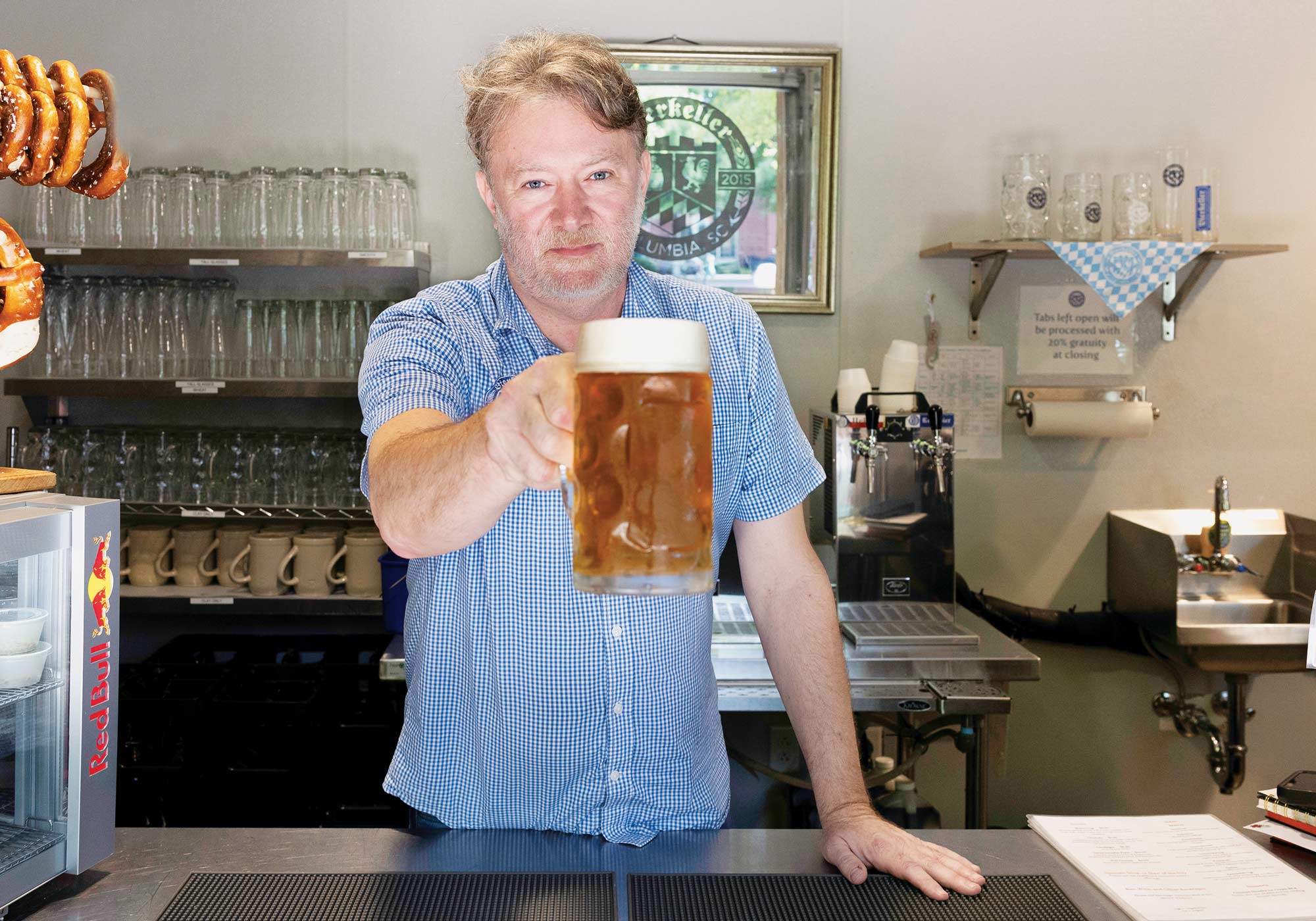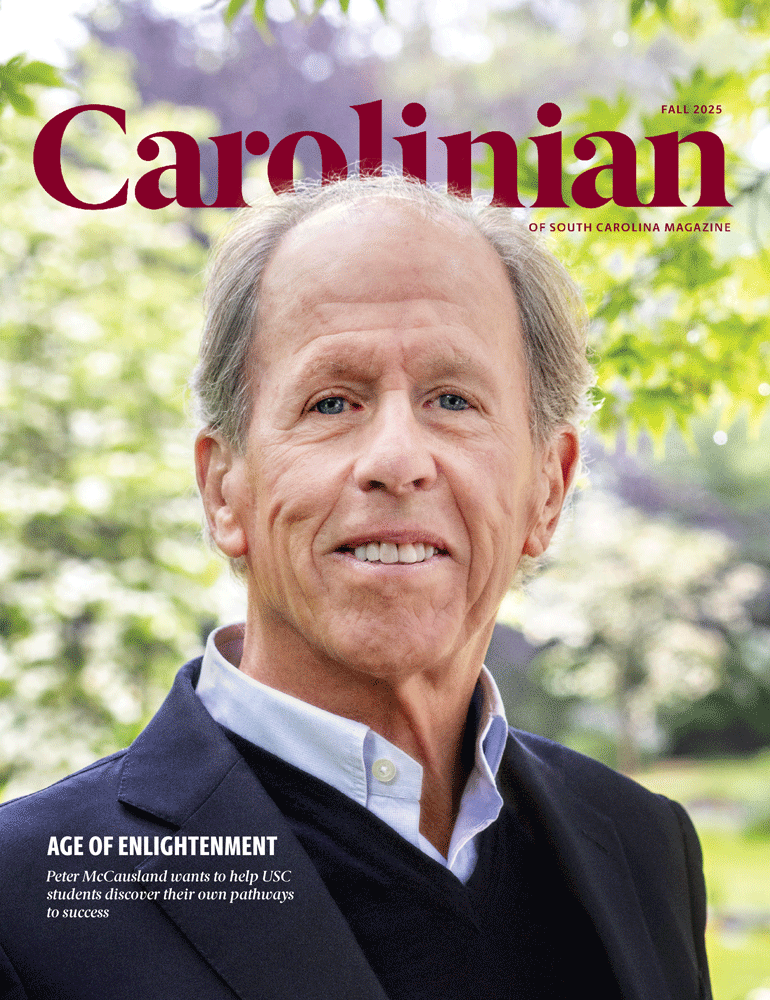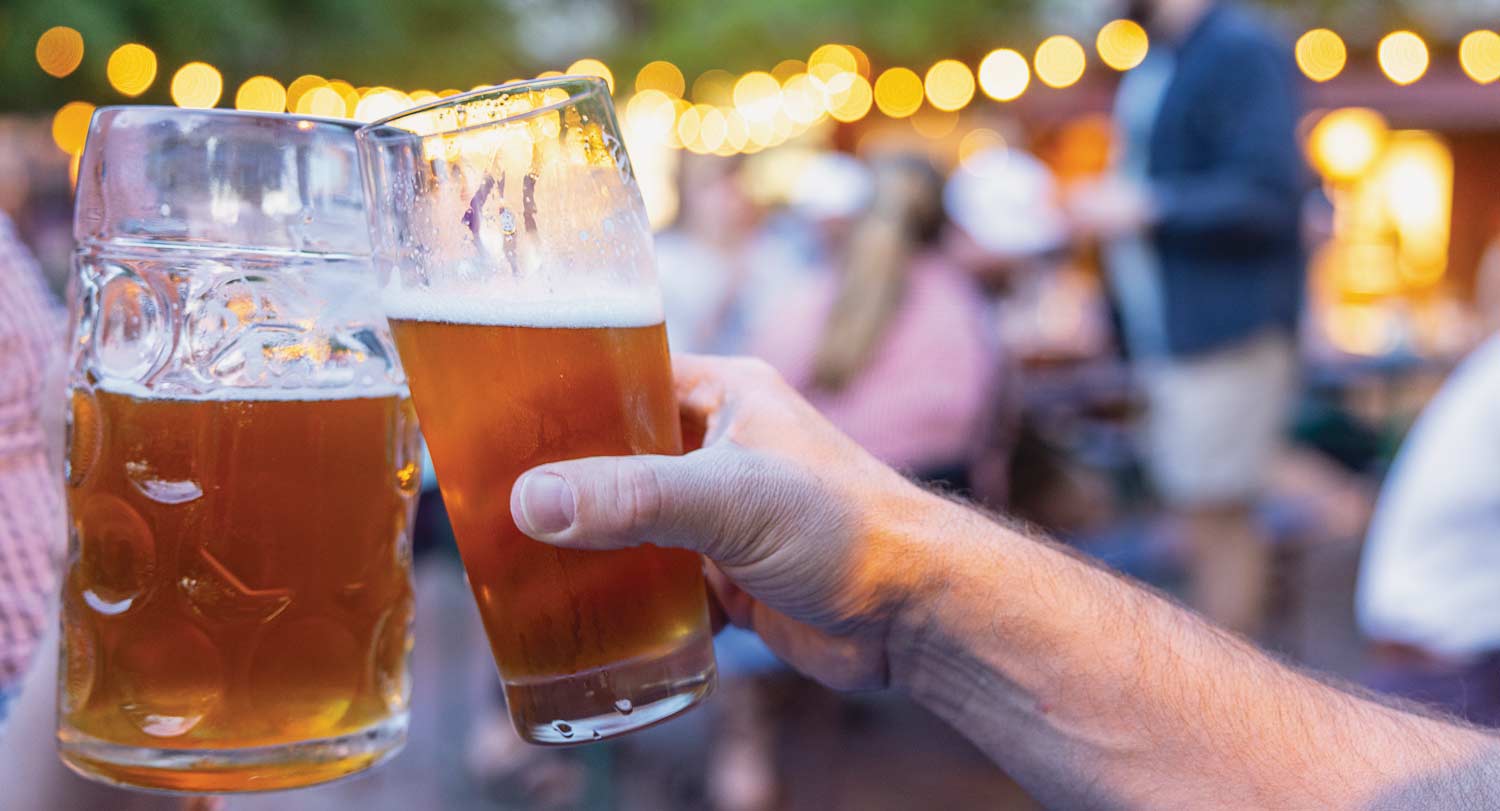
The HVAC amplifies the library silence. Overhead fluorescents shine down between the stacks. Scott Burgess, recent graduate (English and German, ’92), sits cross-legged on the carpet, a volume on Bavarian history in his lap as he searches for a glimpse of his future.
He finds it in a 19th century photochrom print: the old city center of Bamberg, Germany; the town hall; the stone arches of a 15th century bridge spanning the Regnitz River.
Burgess has just been offered a slot in USC’s yearlong exchange program at the University of Bamberg, and he’s psyched. This is the early 1990s, though — the internet isn’t really a thing — so he has made a beeline from his professor’s office in Welsh Humanities to the fifth floor of Thomas Cooper, hoping to find a picture of the town he will soon call home.
“I found something fairly ancient,” he says. “But Bamberg is a UNESCO heritage site. It’s perfectly preserved. Some people might say it’s not representative of Germany — and in a way it isn’t — but it was representative of everything I ever wanted Germany to be.”
Like many USC students who study abroad, Scott Burgess describes his time overseas as almost magical. Everything he had been studying came to life in Bamberg. “I remember writing in my journal at the end of that year, ’I don’t want to go home,’” he recalls.
And if there was one place that really tugged at Burgess’ imagination — one place where the German language, lifestyle and history all came to a head — it was the biergarten. He didn’t just drink in these establishments; he drank them in. He observed the relaxed pace of friends and families unwinding over beers. He took mental notes on the look, the feel, the flow of business. He daydreamed about one day owning such a business himself.
Now, 30 years later, the dream has come true — and he’s sharing it with his hometown, one freshly brewed lager at a time.
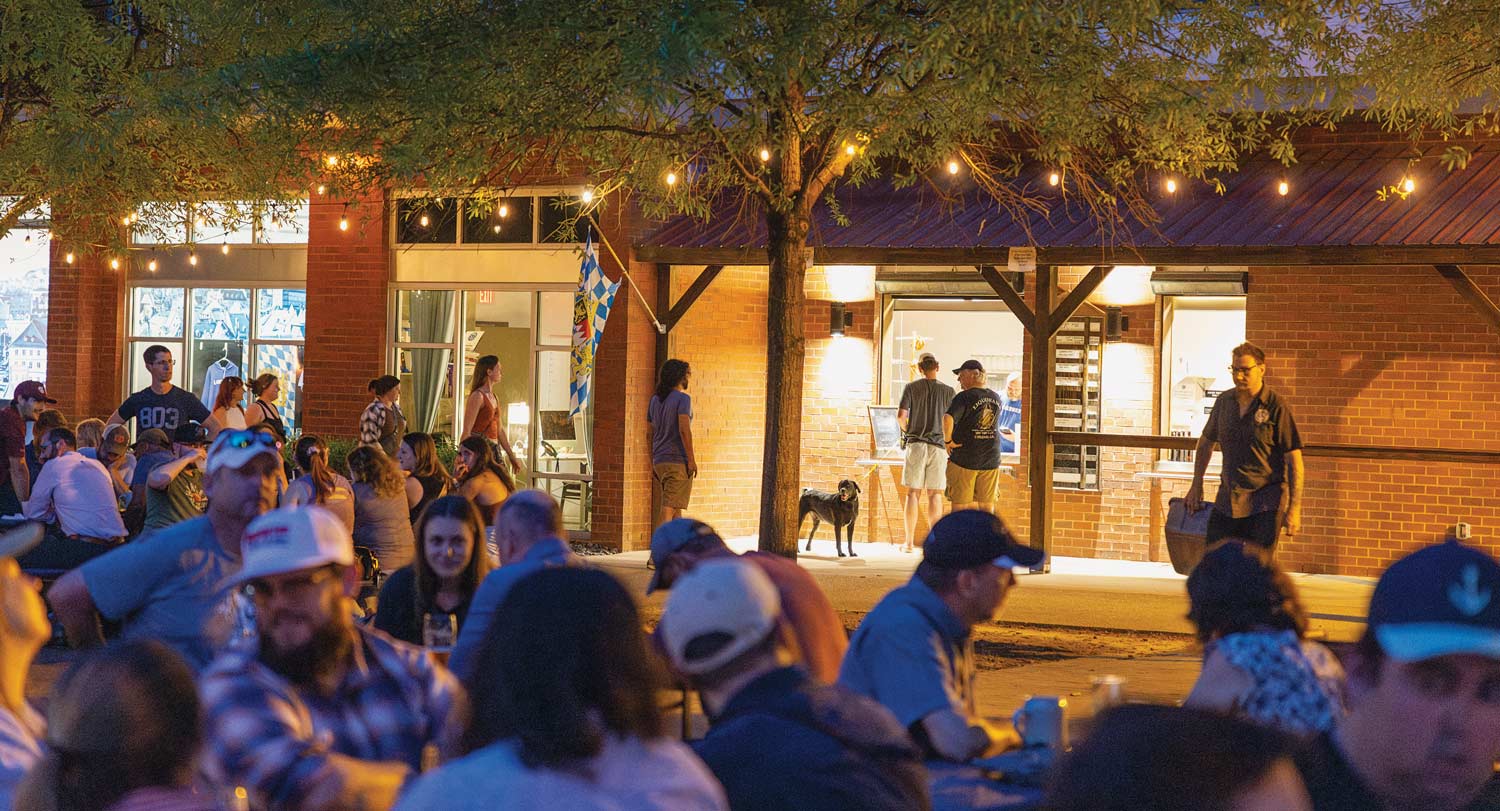
In 2015, after years of homebrewing and some deep-dive homework poring over centuries-old recipes in the original German, Burgess launched Bierkeller, a “pop-up biergarten” serving traditional German beer styles at events around Columbia. Initially, his takes on kölsch, helles, kellerbier and rauchbier were contract brewed at another local brewery, but last fall Bierkeller went full brick-and-mortar.
The combination biergarten, bierhall and German restaurant overlooking the Congaree River from Columbia’s mixed use CanalSide development is anything but another hop-forward craft brewery. There’s no tap wall, there’s no bar; the brewing vessels aren’t the focal point — from the bierhall, you can’t see the gleaming steel tanks at all.
What matters are the shade trees, the atmosphere and the décor, the sun setting over the river and string lights twinkling to life. What matters is the mural of Bamberg, the city where he studied abroad, on the brewhouse wall. Bierkeller is both an oasis and an homage.
“The vision is to bring the culture and the aesthetics of the traditional biergarten — or the bierkeller, which is what they call biergartens in the area of Bavaria where I studied — to my hometown.”
From strict adherence to traditional German brewing methods to a menu rich in traditional Bavarian fare, everything has been executed with an exacting attention to detail. To underscore his commitment, he tells a story about the architect who helped bring Bierkeller to life.
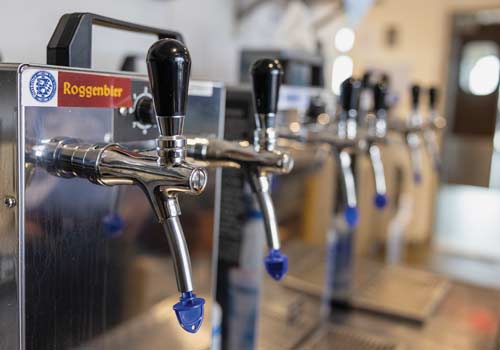
“He had worked on a lot of other breweries,” says Burgess. “Logically, he and his team went in thinking, ’We’ll put a big tap wall here, and we’ll put a big glass wall there so everyone can see the brewing equipment, and we’ll put TVs here.’ I had to come back and say, ’None of that.’”
Some of this is just Burgess’s contrarian personality. “Even if it’s a decent idea, I might say I don’t want to do it just because everyone else is doing it,” he admits. “At the same time, there’s a form and a function to the way German breweries are set up. The Germans are nothing if not deliberate about every little detail that they put into something like this.”
The most important detail, of course, is the beer itself. After years of brewing, you’d think Burgess has his recipes down, but he is always studying, always tinkering, always trying to produce the platonic ideal. To wit, last year he visited a small family hop farm in Bavaria, contracted them as his supplier and tapped into three generations of Franconian hop farmer know-how.
“I asked the grandfather what his favorite hop was, and he told me it’s Hersbrucker,” Burgess explains. “I’d never used Hersbrucker, I didn’t know anything about it — it isn’t something recommended by the literature for the styles we brew — but we recently brewed a Helles with that hop, and it’s just magical.
“You get ahold of some knowledge, or you get ahold of an experience that’s beyond the sum of anything that you could possibly bring to the table yourself, and it really is just magical. There’s no other word for it.”
Less than a year in, Bierkeller is still in its infancy. In fact, Burgess likens opening a new business to one of life’s milestones.
“It’s like having a baby but worse,” he laughs. “The first three months after your kid is born, you don’t really know what the hell is going on. You’re living day to day — and, somehow, you’re not dead. I feel like I’m emerging from that now. We’ve tweaked a few things, but I’m also trying to keep that center of gravity, to stay true to the original vision.”
He calls Bierkeller “a very simple concept,” but that doesn’t make it a simple business. On top of maintaining a steady brewing schedule to keep up with demand and rotating menu items to keep up with the seasons, he is constantly dreaming up new ways to drum up business, including a string of special events.
Since their grand opening in August 2023, Burgess and company have hosted live jazz, celebrated Fasching (Germany’s answer to Mardi Gras) and teamed up with local nonprofits for fundraisers. But the best-attended and most meaningful events have tended to be the ones that speak to biergarten tradition.
There’s Oktoberfest, of course — the lederhosen crowd has been turning out for that since Bierkeller’s pop-up days — but Bierkeller staged an encore of sorts a few months later, pitching tents, lighting firepits and inviting local vendors to Bierkeller Weihnachtsmarkt. The inaugural holiday market, which lasted through Advent, mimicked Germany’s famous Christmas markets and was a hit with families wanting to combine gift shopping with a schnitzel, a beer or a gluehwein, and maybe some sweets.
Having signature events is good for business, but this fall they also provided opportunities to reflect. Burgess recalls standing on the periphery at both events and just drinking it all in. After three years planning and building out the brewery — after almost 30 years of daydreaming, homebrewing and wondering ’What if?’ — the ingredients came together in real time.
“At Oktoberfest, it was when the band was playing, people were dressed up in lederhosen and happy, tents were full, tables were full,” he says. “During the Christmas market, it was when the sun had gone down just a little bit behind the canal. In Germany, they call it the blue hour. We had some folks from the South Carolina Philharmonic playing Christmas music, the fire pits were going, the lights were glowing.”
He pauses to let the nostalgia wash over. The guy who didn’t want to come home from study abroad ultimately did, but the experience stayed with him and inspired not just a dream but a career.
“I actually pulled a few people aside, like, ’This is what’s been up here in my head all these years,’” he explains. “I literally saw the vision that was in my head becoming a reality.”
